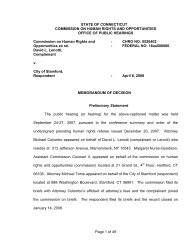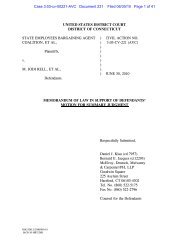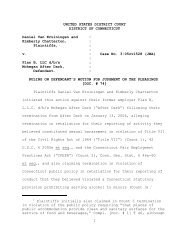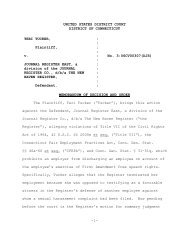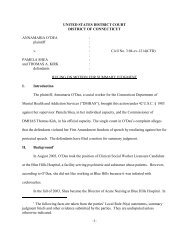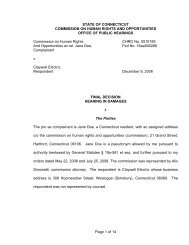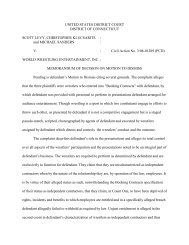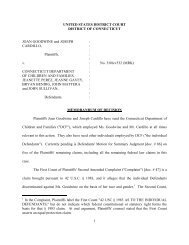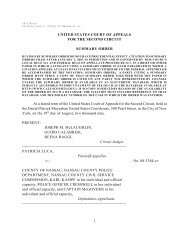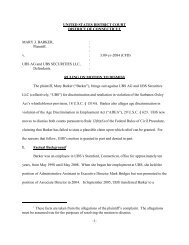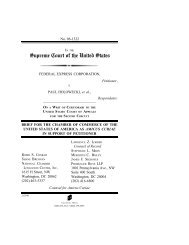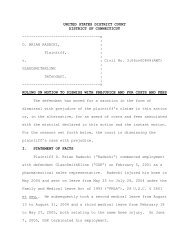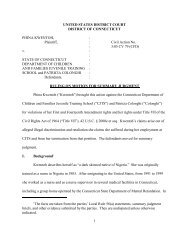You can download a copy of the lawsuit here. - Connecticut ...
You can download a copy of the lawsuit here. - Connecticut ...
You can download a copy of the lawsuit here. - Connecticut ...
Create successful ePaper yourself
Turn your PDF publications into a flip-book with our unique Google optimized e-Paper software.
Case 3:11-cv-00982-CFD Document 1 Filed 06/20/11 Page 1 <strong>of</strong> 20UNITED STATE DISTRICT COURTDISTRICT OF CONNECTICUT************************************************** DOCKET NO. 3:11-cv-982RUTH DIXON, *ISHEA ANDERSON-RODRIGUEZ, ANDRE SMITH, *MAHAGANY BIVENS, SHANTEEMA PALLET, *KENNY FORD, KATRINA CHARLES, *LESLIE GOMEZ **Plaintiffs ***vs. ***SCOTT ZABKA, Individually, *S.Z. ENTERPRISES, INC., and *SCOTT FETZER COMPANIES d/b/a KIRBY ***Defendants * JUNE 20, 2011*************************************************COMPLAINTPRELIMINARY STATEMENT1. This is an action brought by Defendants’ current and former employees seekingcompensatory and punitive damages for Defendants’ fraudulent recruitment and hiring practicesand failure to pay minimum wage and overtime as required by state and federal statutes.2. Plaintiffs bring this case pursuant to <strong>the</strong> Fair Labor Standards Act <strong>of</strong> 1938(“FLSA”), 29 U.S.C. § 201 et seq., <strong>Connecticut</strong>’s Wage Payment Laws, Conn. Gen. Stat. § 31-58 et. seq. and <strong>Connecticut</strong> tort law.DEMAND FOR JURY TRIAL
Case 3:11-cv-00982-CFD Document 1 Filed 06/20/11 Page 2 <strong>of</strong> 203. Defendants promote and sell high-end vacuum cleaners in <strong>Connecticut</strong> from <strong>the</strong>irlocal <strong>of</strong>fice in Orange, <strong>Connecticut</strong>. Defendants recruited Plaintiffs and o<strong>the</strong>r job appli<strong>can</strong>ts towork for <strong>the</strong>m by fraudulently misrepresenting <strong>the</strong>ir business and <strong>the</strong> terms and conditions <strong>of</strong>employment. Among o<strong>the</strong>r things, Defendants promised $500-$800 in pay per week,characterized <strong>the</strong> work as a management-training program and characterized <strong>the</strong>ir business as anappliance outlet or home maintenance company. Not only did Defendants fail to pay $500 perweek, <strong>the</strong>y paid only a fraction <strong>of</strong> <strong>the</strong> amount owed by law. In reliance on Defendants’continued false misrepresentations, Plaintiffs worked without proper compensation and <strong>of</strong>feredup <strong>the</strong>ir own family and friends to Defendants as sales prospects. Defendants led Plaintiffs tobelieve that promised paychecks, bonuses, and prizes were around <strong>the</strong> corner. But as Defendantsknew all along, nothing was around <strong>the</strong> corner. Plaintiffs and o<strong>the</strong>r employees, hoping to earn aliving during hard times, held on until <strong>the</strong>y were ei<strong>the</strong>r broke or figured <strong>the</strong> business for a scam.Defendants <strong>the</strong>mselves enjoyed and pr<strong>of</strong>ited from Plaintiffs’ free labor. Plaintiffs seek relief forDefendants’ violations alleged below.JURISDICTION AND VENUE4. The Court has jurisdiction pursuant to 28 U.S.C. § 1331 and 29 U.S.C. § 216(b).This Court also has supplemental jurisdiction over Plaintiffs’ state law claims pursuant to 28U.S.C. § 1367.5. Venue is proper in <strong>the</strong> District <strong>of</strong> <strong>Connecticut</strong> pursuant to 28 U.S.C. § 1391(b)(2), because a substantial part <strong>of</strong> <strong>the</strong> events or omissions giving rise to <strong>the</strong> claims occurred withinthis judicial district.2
Case 3:11-cv-00982-CFD Document 1 Filed 06/20/11 Page 3 <strong>of</strong> 20PLAINTIFFS6. Plaintiffs Ruth Dixon, Ishea Anderson-Rodriguez, Mahagany Bivens, KennyFord, Shanteema Pallet, Andre Smith, Katrina Charles and Leslie Gomez were, at all timesrelevant to <strong>the</strong> Complaint, <strong>Connecticut</strong> residents and ei<strong>the</strong>r job recruits or employees <strong>of</strong>Defendants, as that term is defined by <strong>the</strong> Fair Labor Standards Act, 29 U.S.C. § 201 et seq., andby <strong>Connecticut</strong> Wage and Hour Law, Conn. Gen. Stat. §§ 31-58(f), 31-71a(2) and 31-76b(3).Plaintiffs worked for Defendants during 2010 and 2011.DEFENDANTS7. Defendant Scott Zabka (<strong>here</strong>inafter “Zabka”) is and was at all times relevant to<strong>the</strong> Complaint a resident <strong>of</strong> <strong>Connecticut</strong>, a distributor <strong>of</strong> Kirby-brand vacuum cleaners, anddoing business as S.Z. Enterprises. His <strong>of</strong>fice is located in Orange, <strong>Connecticut</strong> (<strong>here</strong>inafter “<strong>the</strong>Orange <strong>of</strong>fice”).8. Defendant S.Z. Enterprises (<strong>here</strong>inafter “SZE”) is and was at all times relevant to<strong>the</strong> Complaint a <strong>Connecticut</strong>-based corporation owned, dominated and controlled by its presidentand director, Defendant Zabka. Its sole business has always been <strong>the</strong> marketing and selling <strong>of</strong>Kirby-brand vacuum cleaners in <strong>Connecticut</strong>.9. Defendant The Scott Fetzer Company d/b/a Kirby (<strong>here</strong>inafter “Kirby”) is andwas at all times relevant to <strong>the</strong> complaint incorporated in <strong>the</strong> State <strong>of</strong> Delaware, with its principalplace <strong>of</strong> business in Ohio, and has purposefully directed its activities in interstate commerce andknew or should have known that its actions would have an impact upon <strong>Connecticut</strong> citizens.The Scott Fetzer Company does business as “The Kirby Company.”10. Defendant Kirby only sells its vacuums and related products through a “CompanyMarketing System,” a personnel system, and a business system implemented at <strong>the</strong>ir 5003
Case 3:11-cv-00982-CFD Document 1 Filed 06/20/11 Page 4 <strong>of</strong> 20authorized regional distributors.11. Defendant Kirby conditionally appointed Defendants Zabka and SZE as <strong>the</strong> soledistributor <strong>of</strong> its products in most or all <strong>of</strong> <strong>Connecticut</strong> in 1999.12. Defendants Kirby conditioned that appointment on Defendants Zabka’s andSZE’s acceptance <strong>of</strong> <strong>the</strong> former’s control and domination <strong>of</strong> <strong>the</strong> business and personnel policies.For example, Defendants Zabka and SZE were required to:a) Sell Kirby products “in accordance with <strong>the</strong> Company’s Marketing System”;b) Train employees to work in accordance with <strong>the</strong> “Company MarketingSystem”;c) Recommend a minimum number <strong>of</strong> employees to Kirby each year forappointment as authorized distributors;d) Sign contracts with employees that terminate automatically upon <strong>the</strong>expiration <strong>of</strong> Kirby’s own relationship with Defendants Zabka or SZE;e) Maintain a certain number <strong>of</strong> hires and sales;f) Maintain financial and o<strong>the</strong>r records in accordance with Defendant Kirby’sneeds and make <strong>the</strong>m available for inspection;g) Sell financing through Kirby-owned United Consumer Financial Services(<strong>here</strong>inafter “UCFS”), <strong>the</strong> exclusive financer <strong>of</strong> Kirby products.13. Defendant Kirby fur<strong>the</strong>r controlled and dominated Defendants Zabka and SZE byproviding lawyers, personnel policies, marketing assistance, training materials, promotional andadvertising materials, customer service support, and potential customer leads through toll-freenumbers and internet websites.4
Case 3:11-cv-00982-CFD Document 1 Filed 06/20/11 Page 5 <strong>of</strong> 20CLASS ALLEGATIONS14. Plaintiffs bring this action individually and as an opt-in collective action pursuantto 29 U.S.C. Sec. 216(b) on behalf <strong>of</strong> a class <strong>of</strong> all individuals who worked for DefendantsZabka and SZE at any time in <strong>the</strong> three years prior to <strong>the</strong> filing <strong>of</strong> <strong>the</strong> Complaint who Defendantsdid not pay appropriately for all hours worked as demanded by <strong>the</strong> Fair Labor Standards Act.15. Plaintiffs also bring this action individually and as an opt-out class actionpursuant to Rule 23(b)(3) <strong>of</strong> <strong>the</strong> Federal Rules <strong>of</strong> Civil Procedure, on behalf <strong>of</strong> a class <strong>of</strong> allindividuals who worked for Defendants at any time in <strong>the</strong> two years prior to <strong>the</strong> filing <strong>of</strong> <strong>the</strong>Complaint to whom Defendants failed to pay <strong>Connecticut</strong>-mandated minimum wage andovertime and/or who were fraudulently induced into employment by Defendants’ intentionalmisrepresentations about <strong>the</strong> nature <strong>of</strong> <strong>the</strong> work, <strong>the</strong> rate <strong>of</strong> pay, sign-on bonuses.16. This action satisfies <strong>the</strong> requirements <strong>of</strong> Rule 23(a), in that:A. The proposed Plaintiff class is so numerous that joinder <strong>of</strong> all individuals isimpracticable;B. T<strong>here</strong> are questions <strong>of</strong> law and/or fact common to <strong>the</strong> members <strong>of</strong> <strong>the</strong> proposedclass including, but not limited to, Defendants’ failure to pay <strong>the</strong> minimum wageand overtime required by <strong>Connecticut</strong>’s Wage and Hour Law and <strong>the</strong> fraudulentmisrepresentations made to class members to induce <strong>the</strong>m to accept employmentwith Defendants;C. The claims <strong>of</strong> <strong>the</strong> Plaintiffs are typical <strong>of</strong> <strong>the</strong> claims <strong>of</strong> <strong>the</strong> proposed class;D. Plaintiffs will fairly and adequately protect <strong>the</strong> interests <strong>of</strong> <strong>the</strong> class; and17. This action satisfies <strong>the</strong> requirements <strong>of</strong> Rule 23(b), Fed.R.Civ.P because <strong>the</strong>questions <strong>of</strong> law and/or fact common to <strong>the</strong> proposed Plaintiff class predominate over any5
Case 3:11-cv-00982-CFD Document 1 Filed 06/20/11 Page 6 <strong>of</strong> 20questions affecting only individual members and a class action is superior to o<strong>the</strong>r availablemethods for <strong>the</strong> fair and efficient adjudication <strong>of</strong> <strong>the</strong> controversy.FACTS18. The following allegations in <strong>the</strong> Complaint regarding Defendants’ operations,actions, and omissions were and are true at all times relevant to <strong>the</strong> Complaint, unless o<strong>the</strong>rwisespecified.Defendants Used And Pr<strong>of</strong>ited From Fraudulent Recruitment and Hiring Practices19. Defendants principally recruited and hired for two positions at <strong>the</strong> Orange <strong>of</strong>fice:a) So-called “Independent Dealers” worked both in <strong>the</strong> <strong>of</strong>fice and on <strong>the</strong> road.They solicited referrals from homeowners, distributed promotional materials door-todoor,playacted a scripted product promotion designed to induce homeowners to buyDefendants’ products, and attended mandatory training and daily meetings.b) Appointment Setters worked in <strong>the</strong> <strong>of</strong>fice telephonically soliciting referralsand setting up appointments for <strong>the</strong> Independent Dealers.20. Defendants Zabka and SZE did not intend that ei<strong>the</strong>r Independent Dealers orAppointment Setters would work as part <strong>of</strong> a management-training program, nor did <strong>the</strong>y intendto pay ei<strong>the</strong>r class <strong>of</strong> employee $500-$800 per week. Defendants also knew that <strong>the</strong>ir businesscould not be truthfully characterized as an “appliance outlet” or “home maintenance company.”Never<strong>the</strong>less, Defendants routinely posted newspaper and online advertisements representingexactly those things in order to induce Plaintiffs and o<strong>the</strong>rs to rely on those false statements.21. Plaintiffs and o<strong>the</strong>r job appli<strong>can</strong>ts responded to <strong>the</strong> advertisements andinterviewed at <strong>the</strong> Orange <strong>of</strong>fice. At <strong>the</strong> interview, Defendants Zabka and SZE were deliberatelyvague about <strong>the</strong> job or jobs for which <strong>the</strong>y were hiring, how Plaintiffs would be paid, for what6
Case 3:11-cv-00982-CFD Document 1 Filed 06/20/11 Page 7 <strong>of</strong> 20work <strong>the</strong>y would be paid, and when <strong>the</strong>y could expect <strong>the</strong>ir first check. Defendants <strong>of</strong>fered jobsto virtually everyone, including <strong>the</strong> Plaintiffs, on <strong>the</strong> spot. Defendants hired Plaintiffs ando<strong>the</strong>rs before conducting background checks or calling references, and made fur<strong>the</strong>r promises <strong>of</strong>wages, bonus, and prizes <strong>the</strong>y had no intention <strong>of</strong> keeping.22. During <strong>the</strong> course <strong>of</strong> employment, Defendants Zabka and SZE continued topromise wages, bonuses, and prizes <strong>the</strong>y never intended to pay. For example, <strong>the</strong>y promisedIndependent Dealers compensation for performing 15 product demonstrations in a week, butforeclosed <strong>the</strong> possibility that Plaintiffs could reach that goal by scheduling too-fewappointments. They promised Appointment Setters a bonus if <strong>the</strong>y worked a certain number <strong>of</strong>full-time days in a row, but foreclosed <strong>the</strong> possibility that Plaintiffs could reach that goal bysending <strong>the</strong>m home early on certain days.23. Defendant Kirby directed, conspired to implement, and aided and abettedDefendants Zabka and SZE in <strong>the</strong>se continued misrepresentations with any eye towards pr<strong>of</strong>iting<strong>of</strong>f <strong>of</strong> <strong>the</strong>m. For example:a) Defendants agreed to use fraudulent misrepresentation during <strong>the</strong>recruitment process and agreed to pr<strong>of</strong>it <strong>of</strong>f <strong>of</strong> unpaid labor throughout <strong>the</strong> employmentrelationship with Plaintiffs;b) Defendant Kirby designed personnel policies which included fraudulentjob postings and rules designed to pr<strong>of</strong>it from unpaid labor and disseminated <strong>the</strong>m todistributorships across <strong>the</strong> country -- including to Defendants Zabka and SZE --with anexpectation that those policies would be followed;c) As a result, Defendants Zabka and SZE implemented those policies andPlaintiffs were harmed.7
Case 3:11-cv-00982-CFD Document 1 Filed 06/20/11 Page 8 <strong>of</strong> 2024. In reliance on <strong>the</strong>se fraudulent misrepresentations during <strong>the</strong> recruitment process,hiring process, and course <strong>of</strong> employment, Plaintiffs and o<strong>the</strong>r employees agreed to work forDefendants and continued to work for Defendants until <strong>the</strong>y realized <strong>the</strong>y had been scammed orsimply went broke.Defendants implemented personnel policies designed to avoid paying employees25. Defendants did not classify Plaintiffs Anderson-Rodriguez, Dixon, Ford, Smith, oro<strong>the</strong>r Independent Dealers as employees, but as independent contractors. These employees wereanything but independent, in large part because <strong>of</strong> <strong>the</strong>ir role within <strong>the</strong> Company MarketingSystem:a) Defendants required employees to playact an elaborate product promotionfor those homeowners, referred to as <strong>the</strong> 10-Step Demo Sequence;b) Defendants prohibited employee use <strong>of</strong> any promotion or sales technique<strong>the</strong>y did not require, leaving no air in-between for independent judgment;c) Defendants required employees to report to <strong>the</strong> Orange <strong>of</strong>fice everymorning, six days a week, to participate in two-hour meetings;d) Defendants required employees to travel only to homes chosen byDefendants;e) Defendants required employees to collect new referrals from homeownersfor Defendants’ benefit, and not <strong>the</strong>ir own; andf) Defendants prohibited employees from negotiating prices.26. Defendants did not pay Plaintiffs Anderson-Rodriguez, Dixon, Ford, Smith, orany o<strong>the</strong>r Independent Dealers for a week-long training at which <strong>the</strong>y learned <strong>the</strong> ins and outs <strong>of</strong><strong>the</strong> Company Marketing System, including <strong>the</strong> 10-Step Demo Sequence. That training was8
Case 3:11-cv-00982-CFD Document 1 Filed 06/20/11 Page 9 <strong>of</strong> 20entirely for Defendants’ benefit and useful only for <strong>the</strong>mselves; Defendants hammered home <strong>the</strong>message that Independent Dealers had no independent authority, no discretion to deviate from<strong>the</strong> script, to negotiate a price for Kirby products, or consummate a sale – even for list price.27. During training, Defendants – intent on pr<strong>of</strong>iting even <strong>of</strong>f workers who don’tstick around past <strong>the</strong> first week – required Plaintiffs Anderson-Rodriguez, Dixon, Ford, Smithand o<strong>the</strong>r new Independent Dealers to perform <strong>the</strong> 10-Step Demo Sequence for <strong>the</strong>ir friends andfamily. Defendants calculated that family members would buy things – especially veryexpensive things <strong>the</strong>y don’t need – in order to help out <strong>the</strong>ir loved ones at a new job. Thatcalculation was correct: <strong>the</strong> mo<strong>the</strong>rs <strong>of</strong> Plaintiffs Ford, Charles and Smith purchasedDefendants’ vacuums, as did Plaintiff Dixon’s daughter and Plaintiff Anderson-Rodriguez’family friend.28. At <strong>the</strong> training, Defendants promised to pay Plaintiffs Anderson-Rodriguez,Dixon, Ford, Smith and o<strong>the</strong>r Independent Dealers $500 per week for <strong>the</strong> completion <strong>of</strong> fifteenhome product demonstrations and also promised to pay commissions for demonstrations thatresulted in a vacuum purchase.Defendants Did Not Pay Independent Dealers For Their Work29. After <strong>the</strong> week <strong>of</strong> training was complete, Defendants required PlaintiffsAnderson-Rodriguez, Dixon, Ford, Smith and o<strong>the</strong>r Independent Dealers to attend mandatorytwo-hour morning staff meetings six mornings a week. At those meeting, Defendants distributedappointments and led songs in praise <strong>of</strong> Defendant Kirby. Nei<strong>the</strong>r Plaintiffs nor any o<strong>the</strong>rworker was paid for time spent at those meetings.30. If <strong>the</strong>re were no appointments available on a given morning, Defendants instructedPlaintiffs Anderson-Rodriguez, Dixon, Ford, Smith and o<strong>the</strong>r Independent Dealers to remain on9
Case 3:11-cv-00982-CFD Document 1 Filed 06/20/11 Page 10 <strong>of</strong> 20site until one became available. Independent Dealers were required to, and <strong>of</strong>ten did, spend hourseach day attending meetings and waiting for appointments in <strong>the</strong> Orange <strong>of</strong>fice. If <strong>the</strong>re wereappointments available, Independent Dealers drove to those appointments. Independent Dealersprovided <strong>the</strong>ir own transportation and were not reimbursed for mileage or gas.31. If a homeowner was not available for an appointment, Plaintiffs Anderson-Rodriguez, Dixon, Ford, Smith and o<strong>the</strong>r Independent Dealers received no credit for having donea demonstration. Defendants prohibited Independent Dealers from calling ahead to make surethat potential buyers were in fact home, which resulted in fewer demonstrations for eachIndependent Dealer. When a homeowner was available, Independent Dealers playacted <strong>the</strong> 10-step Demo Sequence and cleaned <strong>the</strong> homeowner’s carpet.32. After completing a given demonstration, Plaintiffs Anderson-Rodriguez, Dixon,Ford, Smith and o<strong>the</strong>r Independent Dealers were required to call <strong>the</strong> <strong>of</strong>fice for <strong>the</strong>ir nextappointment. If none were available, Independent Dealers were instructed to remain in <strong>the</strong>vicinity until receiving fur<strong>the</strong>r instructions from <strong>the</strong> Defendants.33. During <strong>the</strong> time between home visits, or if a homeowner was not at home for anappointment, Plaintiffs Anderson-Rodriguez, Dixon, Ford, Smith and o<strong>the</strong>r Independent Dealerswere expected to go door-to-door leaving cards asking homeowners to register for a contest towin free groceries or to receive a fruit basket. The cards were intended to obtain <strong>the</strong> names andphone numbers <strong>of</strong> prospective customers.34. In a typical day, Plaintiffs Anderson-Rodriguez, Dixon, Ford, Smith and o<strong>the</strong>rIndependent Dealers spent more time in meetings, sitting in <strong>the</strong> Orange <strong>of</strong>fice, distributingcoupons, travelling, and waiting for Defendants’ instructions than trying to induce sales toparticular homeowners through <strong>the</strong> 10-Step Demo.10
Case 3:11-cv-00982-CFD Document 1 Filed 06/20/11 Page 11 <strong>of</strong> 2035. Defendants did not pay Plaintiffs Anderson-Rodriguez, Dixon, Ford, Smith oro<strong>the</strong>r Independent Dealers a dime for time spent in meetings, waiting at <strong>the</strong> Orange <strong>of</strong>fice,travelling, waiting in <strong>the</strong>ir cars, distributing promotional materials door-to-door, or performinghome demonstrations.36. Defendants did not pay Plaintiffs Anderson-Rodriguez, Dixon, Ford, SmithIndependent Dealers or o<strong>the</strong>r Independent Dealers any compensation at all unless a productdemonstration resulted in a sale, because Defendants foreclosed <strong>the</strong> possibility <strong>of</strong> anyIndependent Dealer performing fifteen product demonstrations in a week and earning <strong>the</strong> bonus.37. As a result <strong>of</strong> <strong>the</strong>se personnel policies, Defendants paid Plaintiff Anderson-Rodriguez a total <strong>of</strong> $85 for three weeks <strong>of</strong> work at seventy hours a week, Plaintiff Ford $200for three weeks <strong>of</strong> more than full-time work, Plaintiff Smith $200 for three weeks <strong>of</strong> more thanfull-time work, and Plaintiff Dixon $25 for four weeks <strong>of</strong> more than full-time work. Defendantseventually paid Dixon for trainings and mandatory meetings in a response to a demand by <strong>the</strong><strong>Connecticut</strong> Department <strong>of</strong> Labor. Defendants did not pay any Plaintiff <strong>the</strong> promised $500 perweek.38. Plaintiffs Anderson-Rodriguez, Dixon, Ford, Smith and o<strong>the</strong>r IndependentDealers were not au<strong>the</strong>ntic outside salespeople exempt from wage-and-hour protections because:a) Defendants did not hire Plaintiffs or o<strong>the</strong>r Independent Dealers assalespeople. No prior sales experience was expected or required at <strong>the</strong> time <strong>of</strong> hiring;b) Defendants <strong>the</strong>mselves described <strong>the</strong> work <strong>of</strong> Independent Dealers assurvey or promotional work: “We are not a cleaning service. The Kirby Companysponsors <strong>the</strong> cleaning; <strong>the</strong>y pay our representatives to advertise <strong>the</strong> Kirby machine. T<strong>here</strong>presentative will show [you] a little bit about <strong>the</strong> Kirby and get your comments and11
Case 3:11-cv-00982-CFD Document 1 Filed 06/20/11 Page 12 <strong>of</strong> 20opinions about it and in exchange for your time [that’s why] we’ll do <strong>the</strong> entire cleaningfor you at no charge.”;c) Independent Dealers spent <strong>the</strong> majority <strong>of</strong> <strong>the</strong>ir workweek doingsomething o<strong>the</strong>r than home demonstrations, as described above;d) Independent dealers had no freedom from direct supervision, even duringhome demonstrations. Defendants required <strong>the</strong>m to call <strong>the</strong> <strong>of</strong>fice no fewer than fivetimes during a demonstration, and Independent Dealers had no authority to negotiate aprice or consummate a sale independently; ande) For a portion <strong>of</strong> <strong>the</strong>ir work day, Independent Dealers were doing work thato<strong>the</strong>r people were paid to do; soliciting referrals.Appointment Setters Also Were Not Paid For All <strong>of</strong> Their Work39. Defendants required Appointment Setters, including Plaintiffs Anderson-Rodriguez, Bivens, Pallet, Gomez and Charles, to do an extensive training for which <strong>the</strong>y paidnothing.40. Defendants advised Plaintiffs Anderson-Rodriguez, Bivens, Pallet, Gomez andCharles and o<strong>the</strong>r Appointment Setters that <strong>the</strong>y were subject to termination if <strong>the</strong>y failed toschedule at least one appointment per hour on weekdays and two appointments per hour onweekends. If an Appointment Setter was not able to reach this goal by <strong>the</strong> middle <strong>of</strong> a given day,s/he was ei<strong>the</strong>r sent home early or given <strong>the</strong> “opportunity” to work <strong>of</strong>f-<strong>the</strong>-clock to try and meet<strong>the</strong> quota and preserve her employment. When Defendants’ phones went down, <strong>the</strong>y instructed<strong>the</strong> Appointment Setters to clock out until <strong>the</strong> phones were repaired. Defendants did not payPlaintiffs Gomez, Bivens, or any o<strong>the</strong>r Appointment Setter for time spent working <strong>of</strong>f-<strong>the</strong>-clockat <strong>the</strong>ir instruction.12
Case 3:11-cv-00982-CFD Document 1 Filed 06/20/11 Page 13 <strong>of</strong> 2041. Defendants required Plaintiffs Anderson-Rodriguez, Bivens, Pallet, Gomez andCharles and o<strong>the</strong>r Appointment Setters to attend mandatory staff meetings every Saturdayafternoon. Defendants directed <strong>the</strong>ir Appointment Setters to clock out when <strong>the</strong>y finished <strong>the</strong>irshift and did not pay <strong>the</strong>m for attending those meetings.42. Defendants did not pay Plaintiffs Anderson-Rodriguez, Bivens, Pallet, Gomez andCharles or o<strong>the</strong>r Appointment Setters overtime pay when <strong>the</strong>y worked more than 40 hours perweek.43. When Defendants terminated Plaintiffs Anderson-Rodriguez, Bivens, Pallet,Gomez and Charles or ano<strong>the</strong>r Appointment Setter, <strong>the</strong>y did not issue <strong>the</strong>ir final paycheckswithin twenty-four hours as required by state wage and hour law.44. Defendants acted as joint employers <strong>of</strong> Plaintiffs and all employees working out<strong>of</strong> <strong>the</strong> Orange <strong>of</strong>fice, as that term is defined in <strong>the</strong> Fair Labor Standards Act and <strong>Connecticut</strong>Minimum Wage Act, because:a) Those employees used Kirby equipment, including not just <strong>the</strong> vacuumsand related products but also <strong>the</strong> elements <strong>of</strong> <strong>the</strong> Company Marketing System, including<strong>the</strong> scripts and props used by Appointment Setters and Independent Dealers to promoteKirby products;b) Defendants Zabka and SZE could not shift <strong>the</strong>ir business from Kirby toano<strong>the</strong>r corporation;c) The work <strong>of</strong> those employees was integral to Kirby’s business;d) Defendant Kirby directed Defendants SZE and Zabka to recruit, supervise,and compensate those employees in a particular manner designed to maximize pr<strong>of</strong>its forKirby itself, and had <strong>the</strong> power to discipline SZE and Zabka for failure to do so; and13
Case 3:11-cv-00982-CFD Document 1 Filed 06/20/11 Page 14 <strong>of</strong> 20e) Defendants Zabka and SZE reported directly to Kirby employees whosecompensation from Kirby depended in whole or in part on <strong>the</strong> financial success <strong>of</strong>Defendants Zabka and SZE.NEED FOR INJUNCTIVE RELIEF45. The work and pay records <strong>of</strong> <strong>the</strong> Plaintiffs and members <strong>of</strong> <strong>the</strong> Plaintiffs’ opt-incollective action are in <strong>the</strong> possession, custody, and/or control <strong>of</strong> defendants and defendants areunder a duty pursuant to section 11(c) <strong>of</strong> <strong>the</strong> FLSA, 29 U.S.C. § 211(c), and by <strong>the</strong> regulations <strong>of</strong><strong>the</strong> United States Department <strong>of</strong> Labor to maintain and preserve payroll and o<strong>the</strong>r employmentrecords from which <strong>the</strong> amount <strong>of</strong> defendants’ liability <strong>can</strong> be ascertained. Plaintiffs request anOrder <strong>of</strong> this Court requiring defendants to preserve such records during <strong>the</strong> pendency <strong>of</strong> thisaction to avoid irreparable injury.CLAIMS FOR RELIEFCOUNT ONE:FAIR LABOR STANDARDS ACT – FAILURE TO PAY MINIMUM WAGE(Individual and Collective Action against All Defendants)47. As explained in Paragraphs 5, 25, and 44 <strong>of</strong> <strong>the</strong> Complaint, Plaintiffs andmembers <strong>of</strong> <strong>the</strong> Plaintiff opt-in collective action were jointly employed by all Defendants.48. Defendants’ failed or refused to pay Plaintiffs and members <strong>of</strong> <strong>the</strong> Plaintiff opt-incollective action at a rate equal to or greater than <strong>the</strong> federal minimum hourly wage for all hoursworked, which violated <strong>the</strong> Fair Labor Standards Act, 29 U.S.C. § 206.49. As a result <strong>of</strong> Defendants’ failure or refusal to pay <strong>the</strong> federal minimum wage,Plaintiffs and members <strong>of</strong> <strong>the</strong> Plaintiff opt-in collective action suffered a loss <strong>of</strong> wages owed.50. Defendants’ failure or refusal to pay Plaintiffs and o<strong>the</strong>rs <strong>the</strong> federal minimumwage for all hours worked was knowing, intentional, done in bad faith and evidences a willful14
Case 3:11-cv-00982-CFD Document 1 Filed 06/20/11 Page 15 <strong>of</strong> 20disregard for <strong>the</strong> rights <strong>of</strong> <strong>the</strong> Plaintiffs and members <strong>of</strong> <strong>the</strong> Plaintiffs’ opt-in collective actionunder <strong>the</strong> Fair Labor Standards Act.COUNT TWO:FAIR LABOR STANDARDS ACT – FAILURE TO PAY OVERTIME(Individual and Collective Action against All Defendants)51. As explained in Paragraphs 5, 25, and 44 <strong>of</strong> <strong>the</strong> Complaint, Plaintiffs andmembers <strong>of</strong> <strong>the</strong> Plaintiff opt-in collective action were jointly employed by all Defendants.52. Defendants’ failure or refusal to pay Plaintiffs and members <strong>of</strong> <strong>the</strong> Plaintiff opt-incollective action overtime at a rate equal to or greater than one and one half times <strong>the</strong>ir regularhourly rate for hours worked in excess <strong>of</strong> forty hours a week violated <strong>the</strong> Fair Labor StandardAct, 29 U.S.C. § 207.53. As a result <strong>of</strong> Defendants’ failure or refusal to pay overtime, Plaintiffs andmembers <strong>of</strong> <strong>the</strong> Plaintiff opt-in collective action suffered a loss <strong>of</strong> wages owed.54. Defendants’ failure or refusal to pay Plaintiffs overtime when due was knowing,intentional, done in bad faith and evidences a willful disregard for <strong>the</strong> rights <strong>of</strong> <strong>the</strong> Plaintiffs andmembers <strong>of</strong> <strong>the</strong> Plaintiffs’ opt-in collective action under <strong>the</strong> Fair Labor Standards Act.COUNT THREE:CONNECTICUT WAGE PAYMENT LAWS – FAILURE TO PAY MINIMUM WAGE(Individual and Class Action against All Defendants)55. As explained in Paragraphs 5, 25, and 44 <strong>of</strong> <strong>the</strong> Complaint, Plaintiffs andmembers <strong>of</strong> <strong>the</strong> Plaintiff opt-in collective action were jointly employed by all Defendants.56. Defendants failed or refused to pay Plaintiffs and members <strong>of</strong> <strong>the</strong> Plaintiff class ata rate equal to or greater than <strong>the</strong> <strong>Connecticut</strong> minimum hourly wage for all hours worked inviolation <strong>of</strong> Conn. General Statutes § 31-58(j).57. As a result <strong>of</strong> Defendants’ failure or refusal to pay <strong>the</strong> <strong>Connecticut</strong> minimum15
Case 3:11-cv-00982-CFD Document 1 Filed 06/20/11 Page 16 <strong>of</strong> 20wage, Plaintiffs suffered a loss <strong>of</strong> wages owed.58. Defendants’ failure or refusal to pay Plaintiffs <strong>the</strong> <strong>Connecticut</strong> minimum wagewas knowing, intentional, done in bad faith and evidences a willful disregard for <strong>the</strong> rights <strong>of</strong> <strong>the</strong>Plaintiffs and members <strong>of</strong> <strong>the</strong> Plaintiff class under <strong>Connecticut</strong>’s wage payment laws.COUNT FOUR:CONNECTICUT WAGE PAYMENT LAWS – FAILURE TO PAY OVERTIME(Individual and Class Action against All Defendants)59. As explained in Paragraphs 5, 25, and 44 <strong>of</strong> <strong>the</strong> Complaint, Plaintiffs andmembers <strong>of</strong> <strong>the</strong> Plaintiff opt-in collective action were jointly employed by all Defendants.60. Defendants failed or refused to pay Plaintiffs and members <strong>of</strong> <strong>the</strong> Plaintiff classovertime, at a rate equal to or greater than one and one half times <strong>the</strong>ir regular hourly rate forhours worked in excess <strong>of</strong> forty hours a week, in violation <strong>of</strong> Conn. General Statutes § 31-76c.61. As a result <strong>of</strong> defendants’ refusal or failure to pay overtime, Plaintiffs suffered aloss <strong>of</strong> wages owed.62. Defendants’ failure or refusal to pay Plaintiffs overtime when due was knowing,intentional, done in bad faith and evidences a willful disregard for <strong>the</strong> rights <strong>of</strong> <strong>the</strong> Plaintiffs andmembers <strong>of</strong> <strong>the</strong> Plaintiff class under <strong>Connecticut</strong>’s wage payment laws.COUNT FIVE:CONNECTICUT WAGE PAYMENT LAWS – FAILURE TO PAY WAGES TOTERMINATED EMPLOYEES BY THE NEXT BUSINESS DAY(Individual and Class Action against All Defendants)63. Upon terminating <strong>the</strong>ir employment, defendants failed or refused to pay Plaintiffsand members <strong>of</strong> <strong>the</strong> Plaintiff class all wages owed <strong>the</strong>m by <strong>the</strong> next business day, in violation <strong>of</strong>Conn. General Statutes § 31-76c(b).64. Defendants’ failure or refusal to pay to pay Plaintiffs’ wages when due wasknowing, intentional, done in bad faith and evidences a willful disregard for <strong>the</strong> rights <strong>of</strong> <strong>the</strong>16
Case 3:11-cv-00982-CFD Document 1 Filed 06/20/11 Page 17 <strong>of</strong> 20Plaintiffs and members <strong>of</strong> <strong>the</strong> Plaintiff class under <strong>Connecticut</strong>’s wage payment laws.COUNT SIX:FRAUDULENT MISREPRESENTATION(Individual and Class Action against all Defendants)(Conspiracy and Aiding and Abetting Liability against Defendant Kirby)65. As alleged in Paragraphs 20 through 26 <strong>of</strong> <strong>the</strong> Complaint, Defendantsfraudulently misrepresented <strong>the</strong> nature <strong>of</strong> <strong>the</strong>ir business and <strong>the</strong> terms and conditions <strong>of</strong>employment to Plaintiffs and members <strong>of</strong> <strong>the</strong> Plaintiff class.66. Plaintiffs and <strong>the</strong> members <strong>of</strong> <strong>the</strong> Plaintiff class relied on Defendants’ fraudulentmisrepresentations and only began and continued working for Defendants based on thosemisrepresentations. As a result <strong>of</strong> that reliance, Plaintiffs and <strong>the</strong>ir class suffered damages.67. Defendant Kirby, conspired to implement, and aided and abetted <strong>the</strong> posting <strong>of</strong>those fraudulent newspaper and online advertisements by Defendants Zabka and SZE.COUNT SEVENUNJUST ENRICHMENT(Individual and Class Action Against All Defendants)(Conspiracy and Aiding and Abetting Liability against Defendant Kirby)68. Defendants’ deception and violation <strong>of</strong> state and federal wage payment lawsenabled <strong>the</strong>m to benefit from <strong>the</strong> Plaintiffs’ hours <strong>of</strong> work by realizing pr<strong>of</strong>it from <strong>the</strong> sales <strong>of</strong> itsproducts with artificially low labor costs.69. Defendants have not provided this benefit to Plaintiffs or <strong>the</strong> Plaintiff class.70. Defendants’ conduct has caused Plaintiffs and <strong>the</strong>ir class to suffer <strong>the</strong> loss <strong>of</strong> <strong>the</strong>value <strong>of</strong> <strong>the</strong>ir labor.71. Defendant Kirby directed, conspired to implement, and aided andabetted <strong>the</strong> company policies and practices that led to this unjust enrichment.17
Case 3:11-cv-00982-CFD Document 1 Filed 06/20/11 Page 18 <strong>of</strong> 20PRAYER FOR RELIEFWHEREFORE, Plaintiffs respectfully request that this Court award Plaintiffs and members <strong>of</strong>Plaintiffs’ opt-in collective action and/or members <strong>of</strong> Plaintiffs’ class:1. A declaratory judgment that defendants violated <strong>the</strong> federal Fair Labor Standards Act by:a. Treating Independent Dealers (“Independent Dealers”) as independentcontractors and not as employees <strong>of</strong> defendants and failing to pay <strong>the</strong>mminimum wage for all hours worked and overtime (i.e. time and a half) for allhours worked in excess <strong>of</strong> 40 hours per week.b. Not paying Appointment Setters (“Appointment Setters”) at least minimumwage for time spent in training and for all mandatory meetings withdefendants’ managers and for not paying <strong>the</strong>m overtime (i.e. time and a half)for all hours worked in excess <strong>of</strong> 40 hours per week.2. Monetary damages for unpaid minimum wages and overtime, plus liquidated damages inan equal amount and interest, as provided by 29 U.S.C. § 216(b), in an amount to bedetermined at trial;3. Monetary damages for unpaid minimum wages and overtime, plus liquidated damages inan equal amount and interest, as provided by C.G.S. § 31-68(a), in an amount to bedetermined at trial;4. Monetary damages for unpaid wages upon termination <strong>of</strong> employment, plus liquidateddamages in an equal amount and interest, as provided by CGS § 31-72, in an amount tobe determined at trial;5. Compensatory damages and interest for defendants’ violations <strong>of</strong> <strong>Connecticut</strong> commonlaw, in an amount to be determined at trial;18
Case 3:11-cv-00982-CFD Document 1 Filed 06/20/11 Page 19 <strong>of</strong> 206. All unpaid pay increases not provided to those Plaintiffs who were Appointment Settersand all unpaid “sign up” bonuses for those Plaintiffs who worked more than 30 daysstraight as an Appointment Setter and all unpaid bonuses for sales resulting fromappointments <strong>the</strong>y made;7. All unpaid bonuses earned by those Plaintiffs who were Independent Dealers including<strong>the</strong> promised $500 per week bonus for product demonstrations; bonuses for showingproducts for which a sale is made; and bonuses for showing products which are sold withfinancing through UCFS;8. Any benefit unjustly obtained by defendants from Plaintiffs;9. Punitive damages;10. Prejudgment and post-judgment interest;11. Reasonable attorneys’ fees and costs; and12. Such o<strong>the</strong>r relief as <strong>the</strong> Court deems appropriateTHE PLAINTIFFSBy /s/Susan N<strong>of</strong>i-Bendici,/s/ James Bhandary-Alexander and /s/Shelley WhiteSusan N<strong>of</strong>i-Bendici (ct17611)James Bhandary-Alexander (ct28135)Shelley White (ct05727)New Haven Legal Assistance Assoc.426 State StreetNew Haven, CT 06510(203) 946-4811(203) 498-9271 faxEmail: sn<strong>of</strong>i-bendici@nhlegal.orgEmail: jbhandary-alexander@nhlegal.orgEmail: swhite@nhlegal.orgTheir Attorneys19
Case 3:11-cv-00982-CFD Document 1 Filed 06/20/11 Page 20 <strong>of</strong> 20CERTIFICATE OF SERVICEI <strong>here</strong>by certify that on June 20, 2011, a <strong>copy</strong> <strong>of</strong> <strong>the</strong> foregoing Complaint was filedelectronically and served by mail on anyone unable to accept electronic filing. Notice <strong>of</strong> thisfiling will be sent by e-mail to all parties by operation <strong>of</strong> <strong>the</strong> Court’s electronic filing system orby mail as indicated on <strong>the</strong> Notice <strong>of</strong> Electronic Filing. Parties may access this filing through <strong>the</strong>Court’s CM/ECF System./s/Susan N<strong>of</strong>i-Bendici,/s/ James Bhandary-Alexander and /s/Shelley White20



